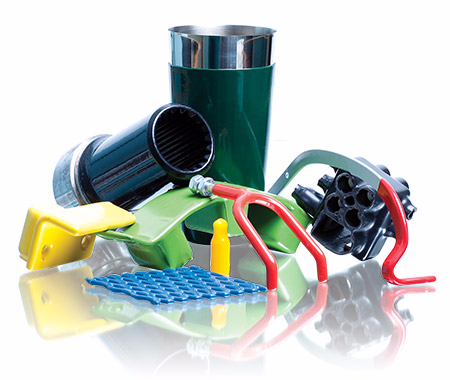Nylon 11, also known as polyamide 11, is indeed a remarkable material, especially when used as a coating.

- Chemical Resistance: Nylon 11 boasts excellent chemical resistance against various substances, including oils, greases, fuels, and many chemicals. This property makes it ideal for applications where exposure to harsh chemicals is common, such as in industrial settings or automotive components. The ability of Nylon 11 to withstand chemical attacks enhances the durability and longevity of coated surfaces, reducing maintenance costs and extending the lifespan of coated products.
- Corrosion Protection: As a coating, Nylon 11 provides effective corrosion protection to underlying materials, particularly metals like steel and aluminum. It forms a barrier that shields the substrate from environmental factors such as moisture, saltwater, acids, and alkalis, which are known contributors to corrosion. By preventing direct contact between the substrate and corrosive agents, Nylon 11 coatings help maintain the integrity and appearance of coated surfaces, even in harsh conditions.
- Abrasion Resistance: Nylon 11 exhibits high abrasion resistance, making it suitable for applications where coated surfaces may experience friction, wear, or mechanical impact. This property is especially valuable in industries like manufacturing, where equipment and machinery endure constant use and abrasion. The abrasion resistance of Nylon 11 coatings helps protect surfaces from scratches, scuffs, and abrasion-induced damage, preserving their aesthetics and functionality over time.
- Flexibility and Impact Resistance: Unlike some rigid coatings, Nylon 11 offers flexibility and impact resistance, allowing it to conform to irregular shapes and withstand moderate impacts without cracking or chipping. This flexibility makes Nylon 11 coatings versatile and adaptable to various substrates and applications, including complex geometries and parts with dynamic movement. The impact resistance further enhances the durability of coated surfaces, reducing the risk of damage due to accidental impacts or mechanical stresses.
- Thermal Stability: Nylon 11 exhibits good thermal stability, with a melting point typically above 190°C (374°F). This property makes it suitable for applications where coatings must withstand elevated temperatures without degrading or losing their protective properties. Whether exposed to heat during processing or operating in high-temperature environments, Nylon 11 coatings maintain their integrity and performance, ensuring reliable protection for coated substrates.
- Electrical Insulation: Another advantage of Nylon 11 is its electrical insulation properties. As a coating, it can provide insulation against electrical currents, preventing short circuits or electrical hazards in components and equipment. This property is valuable in applications where electrical conductivity must be avoided or controlled, such as in electronics, electrical enclosures, and power transmission systems. Nylon 11 coatings help maintain electrical safety and functionality in such environments.
- UV Resistance: Nylon 11 exhibits good resistance to ultraviolet (UV) radiation, making it suitable for outdoor applications where coatings are exposed to sunlight. UV-resistant coatings are essential for preventing degradation, discoloration, and loss of mechanical properties caused by prolonged UV exposure. By resisting UV radiation, Nylon 11 coatings retain their performance and appearance over time, making them durable options for outdoor equipment, structures, and surfaces.
- Environmental Sustainability: Nylon 11 is derived from renewable sources, primarily castor oil, which makes it a more environmentally friendly coating option compared to some petroleum-based alternatives. Its biobased origin contributes to reduced reliance on fossil fuels and lower carbon footprint, aligning with sustainable practices and environmental regulations. Additionally, Nylon 11 coatings can be recycled, further enhancing their eco-friendliness and circularity in material usage.
- Adhesion and Coating Uniformity: Nylon 11 coatings exhibit strong adhesion to various substrates, ensuring proper bonding and uniform coverage. This adhesion is essential for creating durable, long-lasting coatings that resist delamination, peeling, or chipping over time. The ability of Nylon 11 to adhere well to substrates contributes to the overall performance and effectiveness of coated products, maintaining their protective and functional properties throughout their service life.
- Ease of Application: Nylon 11 coatings can be applied using various methods, including electrostatic spray, fluidized bed, and dip coating, depending on the specific requirements of the application. This versatility in application methods makes Nylon 11 coatings accessible and practical for a wide range of industries and coating processes. Moreover, the curing process for Nylon 11 coatings is relatively straightforward, requiring standard curing temperatures and times for proper film formation and adhesion.
In conclusion, Nylon 11 stands out as a superior coating material due to its exceptional chemical resistance, corrosion protection, abrasion resistance, flexibility, impact resistance, thermal stability, electrical insulation, UV resistance, environmental sustainability, adhesion properties, and ease of application. These characteristics make Nylon 11 coatings a preferred choice for numerous industrial, commercial, and residential applications, offering reliable protection, durability, and performance in diverse operating conditions.
For more infomration, please feel free to contact us.

